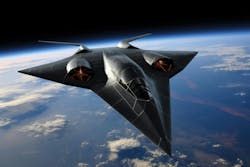NEW YORK - The promise of traveling from New York to London in less than 60 minutes, or Los Angeles to Tokyo in three hours, has been around since 1949, when an unmanned two-stage Bumper rocket blasted through the sky at 5,150 mph. About 12 years later, the U.S. Air Force’s X-15 became the first piloted aircraft to achieve hypersonic flight, generally defined as reaching a minimum of Mach 5 (five times faster than the speed of sound) or 3,800 mphJ. George Gorant and Michael Verdon write for the Robb Report. Continue reading original article.
The Military & Aerospace Electronics take:
25 March 2025 - Engineers are tackling hypersonic challenges, particularly extreme heat, with materials like titanium, nickel-chromium superalloys, carbon fiber, and NASA-style thermal tiles. Wind-tunnel testing and computational fluid dynamics shape designs, favoring smooth delta-wing configurations.
Experimental ramjet and scramjet engines, operational above Mach 3, are also progressing. Australia’s Hypersonix is developing the Dart demonstrator, featuring a 3D-printed Spartan scramjet engine, set for U.S. testing this year with Rocket Lab’s support.
Despite these breakthroughs, commercial hypersonic travel remains distant due to cost. Switzerland’s Destinus, once aiming for a 2030 launch, has shifted to defense, citing a lack of investment. "The technology exists," says CEO Mikhail Kokorich. “The funding does not."
Related: US scientists 3D print dark ceramics to boost hypersonic aircraft
Related: Boom Supersonic’s XB-1 achieves first faster-than-sound flight
Jamie Whitney, Senior Editor
Military + Aerospace Electronics

